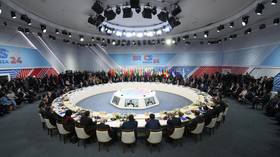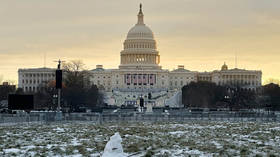Reopening of Jordan-Syria crossing signals regional powers move to restore ties with Damascus
The newly re-opened border crossing between Syria and Jordan will not only help to restore a key Middle East trade route but also move regional actors to restore relations with Damascus, experts told RT.
On Monday the main border crossing known as Jaber on the Jordanian side and Nassib on the Syrian side was operational again. Another Syrian border crossing that opened on the same day was the one with the Israeli-occupied Golan Heights.
Trade revival is expected to become the most visible immediate effect of the development, both in terms of bilateral business links between Syria and Jordan and a broader situation in the region. “This will open the door to more trade between Syria and Jordan, which would benefit people on both sides of the border,” Ammar Waqqaf, the director of Gnosos, a British think tank that focuses on crises in Syria and the Middle East, told RT.
The road between Damascus and the Jordanian capital of Amman was once a major regional trading route linking the Mediterranean ports of Lebanon, Syria and Turkey to the markets of the Gulf States. Lebanon already praised the reopening of the border crossing as a chance to improve the national economy, which was also severely hit by the Syrian war.
Lebanon’s president, Michel Aoun, called the route between Damascus and Amman a “vital lifeline” for many Lebanese industries while complaining that Lebanon’s export to the Arab countries fell by 35 percent because of the closure of this transport corridor.
“It will … help Lebanon [to trade] with the likes of Jordan and the rest of the Arab peninsula,” Jamal Wakeem, a professor of history and international relations at Lebanese University in Beirut, told RT, adding that “it will also help Lebanon overcome certain economic difficulties” it faces since the start of the Syrian crisis because it mostly relies on Syria “as a transit country in trade.”
With its trade routes restored, Syria could regain its former status of one of the key elements of the Middle Eastern economy and trade, Wakeem added.
‘Strategic effects’
Apart from the economic benefits, the revival of the trade routes could also greatly enhance Damascus’ position at the regional level, the experts believe. “Jordan has been the first to change its position” towards the Syrian government, Waqqaf said, adding that others might yet follow suit.
#Assad says #Syria reaches ‘understanding’ with Arab states – report https://t.co/9b4bszva20pic.twitter.com/im4nu9BVzS
— RT (@RT_com) October 4, 2018
Syria is now being increasingly “accepted by its neighbors as a country, which stability is important to everyone around,” the director of Gnosos told RT. Even such regional actors as Qatar or Saudi Arabia, which have initially taken a “harsh” stance against Syria and “wanted the Damascus government to fall,” are now “starting to accept the fact that it will not happen” and the Syrian government is not going anywhere, he added.
“It is also not in their interest to keep destabilizing Syria, as, otherwise, instability could spread across the border,” Waqqaf said. “At the strategic level, we see more acceptance of … the Syrian government” on the part of the Arab countries, he explained.
If Syria manages to normalize relations with its regional neighbors, it will significantly decrease the leverage that the West could potentially have over Damascus, Waqqaf believes, implying that such developments could cement the Syrian government position worldwide.
Apart from that, gradual recovery of the Syrian economy coupled with the normalization of relations between Damascus and its neighbors would accelerate the return of the Syrian refugees from such countries as Jordan and Lebanon back to their homeland – something that Europe in particular is likely to be closely following.
“Europe would like to see their refugees to go back as well,” Waqqaf said, adding that, although the Western countries have long linked the return of refugees with “some political changes in Syria,” they would not be able to “mount a lot of pressure on the Syrian government” in the face of its improving international posture. “This could force them [the European countries] to change their position” and start restoring their relations with Damascus, he added.
The Jordan-Syria border crossing was closed by the Jordanian authorities back in April 2015 as the Syrian post was seized by the militants. Syrian government troops retook their side of the crossing in July 2018 under a deal with rebel fighters brokered by Russia. According to an agreement between Jordan and Syria, the traffic of passenger and goods at the border crossing will resume daily from 5am to 1pm GMT.
Like this story? Share it with a friend!













